- Home
- Hugo Hamilton
The Last Shot Page 9
The Last Shot Read online
Page 9
Bertha wanted to swim. She looked forward to bathing properly for the first time in days and even had a small piece of soap left. It felt like the last piece of soap in Europe. By the time the sun and sky began to tint red, she had found an enclave where she could swim in complete privacy. She had the whole lake to herself.
Franz Kern was a decent man, she could assure herself. She could trust him not to spy on her. He was married. She felt she knew him well enough to trust him.
She removed all her clothes and placed them by a tree. She took only the soap with her. She had felt nothing so free and soothing as lake-water in years. It was so cool at first, it shocked her. Small clouds of soapy water drifted around her as she washed. She ducked her head down and washed her hair. She heard the silence of the lake underneath each time. A silence full of trout.
When she had finished washing, she threw the soap up on to the bank, where she hoped it wouldn’t collect grit.
She swam out a little, into the lake. She felt she was swimming with the trout. Her body looked like gold through the brown mountainy water. She had escaped the worst of this war. Even as she was swimming she remembered to thank God; a mental thanks as she turned on her back and kicked her legs. The sound of the splashing echoed across the lake. It was peacetime in Germany. Then at times she had an idle suspicion that Franz might be sneaking a look at her. She dismissed it and thought it was only her imagination. She saw nothing but the interior of the woods, which had now turned dark with the absence of light.
The lake itself was still quite bright. The reddish sunlight had turned the trunks of the trees at the edge to bronze. Bertha swam to the bank and stepped out of the lake, water dripping on to the stones. She left footprints on the hard earth. She began to dry herself, feeling the last of the day’s heat. She got dressed and picked up the small bar of soap. With her fingernail she prized off three brown pine needles and wondered if she would offer the soap to Franz. Of course she would.
She threw the towel over her arm and stared out at the lake. The midges still hovered over the water. She couldn’t believe her eyes. It was like a painting.
On the far side of the lake, two men in the darkness of the trees had been watching her. Two Polish exiles. They had been in these woods for weeks. They had not seen soap for months. They had not seen the sight of a naked woman for years.
26
When Bertha came back, she offered Franz the soap. He thanked her and went away to wash himself while she prepared the food. There was so little left that it was difficult to call it a meal. They had managed to get some bread and gherkins from a farmer along the way. She was amazed how generous people were towards them.
She prepared the meal as festively as she could. She spread a headscarf out along the floor and placed the food on it. Within minutes, her prepared evening meal had been discovered by ants and she had to rearrange the whole thing somewhere else. She eventually set up her table on top of her bag a little back from the edge of the lake. She had to keep on beating off insects as she did so.
Franz came back. The sky moved through a spectrum of colours until it rested at a deep blue again. They sat down and ate their frugal meal in peace. They watched the blue of the sky fade into a navy. Stars came out. The moon lit up the lake.
Long after their meal, Franz sat back and lit a cigarette while Bertha cleared everything away. His face lit up over the small flame. The red cinder at the top of his cigarette waved about in the dark as he talked. Their voices drifted through the forest and out across the lake. Sometimes Bertha laughed and her laugh would come back in an echo. The red cinder jumped in the air and landed in the lake, where it went out with a fizzle.
They kept talking for a long time in low tones. Franz talked about beauty. He was such a cultured man, Bertha thought to herself. He knew all of the Verdi operas. She didn’t believe him at first. But then he sang some notes. He said he was more fond of swing. So was she. He sang the start of some swing tunes.
Sound travels clearly across water. Occasionally, a startled wood pigeon took off out of the trees along the lake. Sometimes they heard the sound of a strange bird. All the time they heard fish in the lake jumping at flies. The mayfly. In the distance, they heard a deer barking. The fervent clatter of nature reassured them. Whenever the woods fell silent, it was almost too empty.
She had been a little disappointed when Franz returned the tiny bar of soap to her with some granules of sand imbedded in one side. But she could forgive that. Otherwise, he was a refined man. Her mother would have been impressed with him. He had nice hands. Maybe it was a pity he was married.
Franz said the forest was like an orchestra of sound. Bertha agreed.
‘It’s like music,’ he said.
‘That’s true. I was just about to say that myself.’
They could no longer see each other properly in the dark. Only as silhouettes against the lake. It made it easier to say things. She began get her coat ready. Her simple bed.
Franz lit another cigarette. She liked the smell of smoke out in the open. It smelled like the cities she had been in. Paris, Prague, Cologne.
It was late. They looked at the stars for a while.
‘Thank God, we’re alive,’ she said suddenly, almost startling herself. It was something she would only say to herself privately. ‘I feel we’ve been so lucky,’ she added, trying to shift the emphasis.
Franz said nothing. Maybe what she’d said had ruined the atmosphere. Why speak about what might have happened? It was so strange being in the dark with a man. But she trusted him. He talked about the stars.
Once again she saw the end of the cigarette being projected in an arc out into the lake, where it died with another short fizzle. Franz approached her and stood in front of her. She could see nothing but the shape of his head against the sky. He leaned forward. Without a word, he kissed her on the mouth.
The calmness of the night had taken her by surprise. She didn’t resist. It would have been like resisting all of nature. It would have felt like denying the lake and all its peaceful beauty. What could be more honest than nature?
He placed his arm around her. At first she gave herself to the kiss, as though she were once more swimming in the lake. She swam in his arms. She tasted the tobacco on his lips. Smelled the smoke in his clothes.
For months during the war, she had renounced all attraction to anyone. Even the smallest liking for anything other than her work and her daily walk to Mass in Laun seemed a desertion of her own principles. Now she had fallen into a deep kiss and realized how much she had liked Franz Kern all along.
What would happen next? She pulled away and asked him to stop.
‘Forgive me, Bertha,’ he said. ‘It’s the lake. All this peace in the air. Please forgive me. I shouldn’t have done that.’
‘It’s nothing,’ she said.
They stood in soft white light, moonlight reflected up from the lake. She didn’t know what to say.
‘I’m sorry,’ he said. ‘It’s the moon. I don’t know what came over me.’
It was an innocent kiss. What harm, she thought. Maybe he even deserved it for saving her life, for bringing her safely back to Germany. But she couldn’t say any of that. She was embarrassed. They said no more about it. They couldn’t let it happen again. Bertha began to get busy arranging things. Franz stepped away, down to the edge of the lake, in order to let her prepare her bed for the night. They said goodnight to each other. They tried to behave as though nothing had happened.
The forest was filled with allusions. The lake shone with significance. Franz listened to Bertha breathing, unsure whether she was asleep or not. She lay awake with her eyes open, looking at the stars, listening to the forest. She refused to let herself speak.
27
On the far side of the lake, the two men were still watching. They had seen faces lighting up under the flare of a match. They had heard the voices, and the laughter. They had seen the butt ends of cigarettes being tossed into the lake. Their minds
were full of desire. Driven insane by the sight of food, and cigarettes, and the sight of a German woman swimming in the lake at dusk.
All over Germany, the retreat went on, relentless. Everybody in Europe was on the move. Some going home, some going to find new homes. New places where they could find peace. Everywhere, people now discovered the destruction of the war. The Germans were travelling west. The Czechs, Poles, Armenians, among many other races, were all moving east. All those who had been displaced by the Reich and brought to Germany as forced labour were now going back, angry, impatient to see their homes. They took with them what they could carry. People slept by the roadside, under trees, in barns, or under the stars in the fields. Those who had possessions hid them, or slept with them, or held them in their hands, or rolled them up in their jackets as pillows. Truck drivers and car drivers fell asleep at the wheel. Anyone who had salvaged something from this war had a head start on others with nothing. They were envied. They were watched.
And some people didn’t sleep at all. They walked on, desperate to find out what happened at home, anxious to restart their lives, longing to reunite with their sweethearts, of whom they still had a small, torn, black and white photograph, or families and children who had grown out of recognition since they had parted. And some people were going home to nothing. Nobody. Just ruins.
There were Polish and Russian exiles who had a long way to go. People who would never even get home. There were men who had escaped from their factories in Nuremberg or Stuttgart and taken to the woods and the mountains, knowing that the war was near the end. Men who had been on the run from the SS and from the inhabitants who would have pointed them out. Men who were angry at the time which had been taken from them by the Reich, who were angry and ready to avenge the stolen years. There were no rules. No code of conduct. It was every man for himself.
The men on the far side of the lake settled down for the night. They had assumed that Bertha was a local girl. After dark, they heard nothing. They saw no more cigarettes lighting up. They assumed she was gone.
They were left listening to the sound of the lake; the fish, the occasional bird winging across the surface. They were tired, like anyone else on the move. They had already raided some houses, ordered the outraged and terrified occupants of remote farm-houses outside while they took with them the smallest, most precious, valuables.
They were aware they had come close to the Czech border. From there on they would have to behave under new laws. Until then, they used the lawless twilight of Germany’s defeat. They settled in the post-war chaos and fell asleep.
While all of Germany slept, the chaos of the forests receded. Sometimes an owl broke the silence. Or a frightened dove clattered away across the trees. Fish still broke the surface of the lake where the stars were reflected. Everybody slept. A land that had become used to the noise of sirens and planes was now getting used to the silence.
In the middle of the night, the two men awoke with a fright. They sat up. Perhaps it was already close to dawn. They both heard it at the same time. It was clear. A piercing shout which startled the environment. The sound of it still echoed in their ears like the cry of some unknown animal.
‘Did you hear that?’ one of them asked.
But they both knew what it was. It was as though every bird and every silent fish in the black lake had heard it too.
It was the shout of a woman.
A piercing cry, somewhere between pain and pleasure. They knew where it came from across the lake. At first it frightened them. Then it filled them with desire and wild excitement; an intimate feeling, as though they were right there with the woman. As though they had participated. As though there was no distance between them and no lake. After that, they began to feel an angry desire. They held their breath, listening for more.
They knew it was her. The German girl across the lake. The woman they had seen swimming. They could still hear the echo of her love-shout receding in the trees, in the widening rings on the surface of the lake.
They couldn’t sleep.
28
It was already bright when Bertha woke up. Franz had his arm around her, underneath her neck. She was still half asleep, but she was aware that everything had changed. She looked at Franz beside her, half covered by her russet coat, breathing quietly through his nose. This can’t be wrong, she thought to herself. If anything, this was a new start. It was the first day of her life, her new life with Franz. She couldn’t wait. One moment she was afraid of what the future would bring. Next minute she was completely unafraid.
She sat up and looked out at the lake. She saw Franz waking up. His eyes and his deep voice banished all fear. They smiled at each other. They talked. They were together.
It was a morning for dreaming. The sun was already beating down on to the lake, throwing a strong white glare back into their eyes. The brightness brought tears to her eyes.
At first, Franz misunderstood. She wasn’t sad. On the contrary, she was crying because she was happy. The war was over. She had a life ahead of her. And Franz Kern. The slightest thing would have tossed her into tears. She wasn’t worried. She was surprised that nothing worried her. She didn’t want to think what her mother would say. All she wanted was to stay on that shore of the lake and not move.
‘It’s nothing,’ she said. ‘I’m just happy. Am I allowed to say that?’
‘Why not? You’re only saying what the sun is already saying.’
Franz said the most perfect things. Nothing old-fashioned, nothing rehearsed. They paused and looked at the water, wincing in the reflected light. He kissed her gently on the lips, on the side of her face, and then drew back.
‘America,’ he said.
She embraced him. After a long time she slowly let go. Franz stood up and walked to the edge of the water while she sat and looked at his broad back. That was the way they were for a long time, maybe up to ten minutes. He knew she was looking at him. She knew he was thinking about her.
Bertha went to bathe again. She went to the same place where she had been the previous evening. He could hear her splashing and singing. This time he spoke to her, in shouts which echoed back across the lake.
‘You’re not going to spend all day swimming, are you? We want to get to the USA today…’
She laughed. But she felt shy. She still couldn’t make herself talk back to him while she was naked in the water. The water was cooler than the night before. She was shocked by it. She was also shocked by the thought that Franz might be so close that he could take a peek at her through the trees. Maybe she half wanted him to look.
If only her sisters could see her now. But then it occurred to her that it was all too illicit and she stepped out of the water again. The soap had shrunk to half its size. She would have to ration it from now on. Who knew when she could bathe like this again?
They had breakfast, what was left of the black bread and the stale cheese. They laughed about it. They ate everything they had. The Breakfast of Lovers. They kept looking each other in the eyes. They talked about America again.
‘We’ll have to make our way to Hamburg first,’ he said.
‘But I’ll have to go and see my family first. I’ll have to tell my sisters and my mother about our plans. And then say goodbye. They probably think I’m lost anyway.’
‘Of course,’ Franz said. ‘We will do this calmly. We’re not running away from anyone. We will get married in America, as soon as we arrive.’
‘My mother will win back a daughter and lose her again on the same day. But I think they’ll all be happy for me.’
There were practical things to think about. Money. She said she would be able to get some money together. Her aunt would help. And her sisters. They had little, but somehow they would scrape the fare together.
‘Two of my older sisters, Frieda and Maria, were meant to emigrate to Brazil. They had it all planned in nineteen forty. They weren’t the only ones. Lots of girls and their husbands were going together. But Frieda and Maria didn
’t go because they fell out with their boyfriends…
‘Anyway, my mother didn’t want to see them go. She would have let them. But she was glad when they didn’t.’
‘And where are they now?’
‘They’re married. The eldest is living in Salzburg. Maria is living in Frankfurt. If there’s anything left of that city.’
‘I’m sure it’s like Nuremberg,’ Franz said. ‘There was little left of it when I saw it last. We were probably the luckiest ones, to be in Laun, in the middle of nowhere.’
Bertha was barefoot. She began to brush off the dried bits of forest debris which had attached themselves to the soles of her feet. She found bits in between her toes. She thought they must have got there in the water.
‘You have beautiful feet,’ Franz said. It was an honest comment. And it was true. She knew it.
‘You think so?’ she probed.
‘Oh yes. So many women have ugly feet. Real size thirteens. But your feet are so small and pretty.’
She paused. Allowing the compliment to settle.
‘How do you know so much about women’s feet?’ she demanded, smiling.
‘No. I didn’t mean it that way,’ Franz answered. He felt caught out and embarrassed. He didn’t want to talk about his wife in Nuremberg. ‘I meant, it must be obvious that some people have nice feet. I don’t know. All I know is that yours are very pretty.’
Bertha placed her feet on a grass patch where they would stay clean. She bent her knees up and gathered her dress around her legs. With her eyes closed, she placed her chin on the top of her knees, like a child on a window ledge, facing into a wall of bright sunlight. She could feel her hair and her scalp begin to dry in the sun.
‘They’re not really made for cycling though,’ Franz added.

 Dublin Palms
Dublin Palms The Pages
The Pages The Sailor in the Wardrobe
The Sailor in the Wardrobe Every Single Minute
Every Single Minute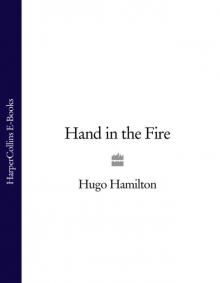 Hand in the Fire
Hand in the Fire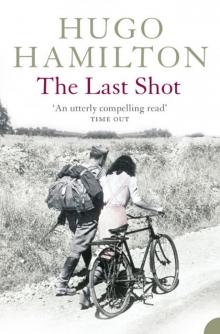 The Last Shot
The Last Shot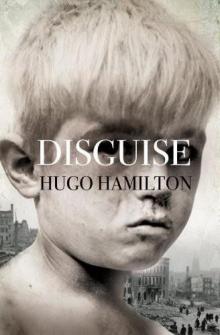 Disguise
Disguise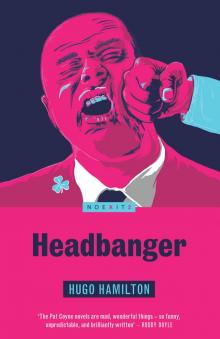 Headbanger
Headbanger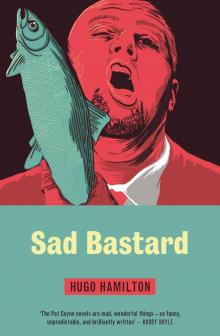 Sad Bastard
Sad Bastard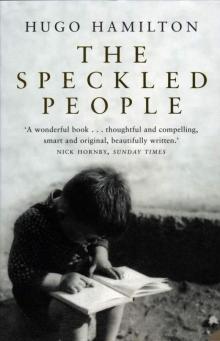 The Speckled People
The Speckled People